Israel Kills Hezbollah Field Commander In Lebanon
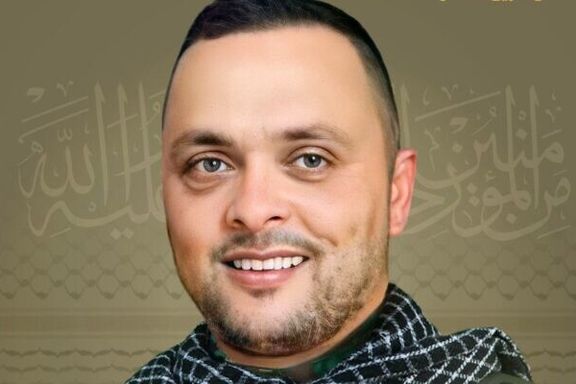
An Israeli strike on southern Lebanon early on Monday killed a field commander in the heavily-armed Iran-backed Lebanese group Hezbollah, as the United Nations warned that shelling was spreading.

An Israeli strike on southern Lebanon early on Monday killed a field commander in the heavily-armed Iran-backed Lebanese group Hezbollah, as the United Nations warned that shelling was spreading.
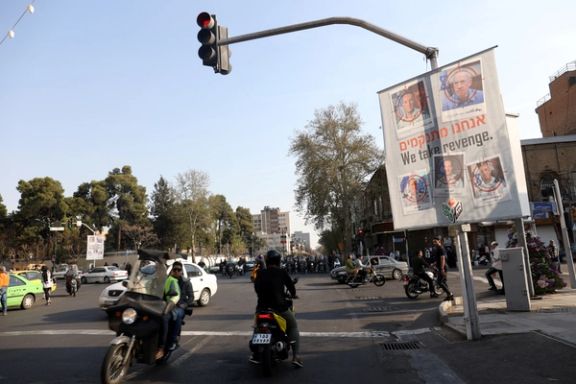
An unconfirmed, single-sourced report is alleging that Tehran promised Washington it would not retaliate to last week’s Israel’s airstrike, which killed several of the regime’s senior Islamic Revolutionary Guards commanders in Syria.
The alleged condition for Iran’s restraint? A ceasefire in Gaza.
That report by Jadeh Iran – unconfirmed by Iran International – is now circulating not just on social media, but has landed in the pages of Israeli news outlets.
Notably, the Iranian regime’s own propaganda media outlets are also giving it credence, including semi-official ILNA and Shahre Khabar.
But, who does this narrative serve? And, where is the original report coming from?
It’s true, the Biden administration, increasingly under pressure to find a solution to Israel’s relentless pounding of Gaza, would certainly benefit from a ceasefire – not in the least at home where several polls show a difficult road ahead for President Joe Biden campaign to hold-on to another term against Donald Trump.
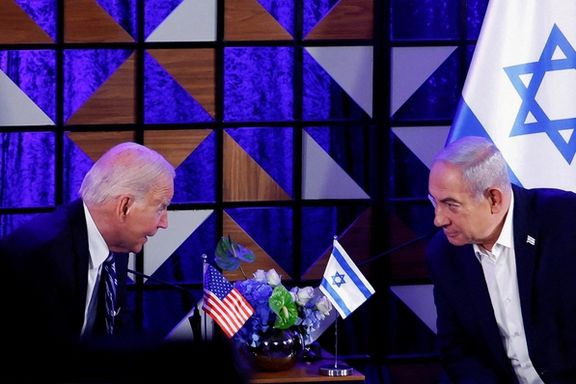
On Iran’s side – desperate to get sanctions relief and already embroiled in multiple of its proxy wars in the region – the regime would do well by refraining from retaliating against Israel – and drawing less anger from the US.
In fact, that alleged report, citing only one Arabic diplomatic source, suggested that "If America succeeds in containing the situation, it will be a great success for the Biden administration and we can build on that".
Kuwaiti-based Al Jarida has since cited a source in the Iranian Foreign Ministry claiming that Washington’s latest proposal to Tehran – though a Swiss mediator – is offering direct negotiations with Tel Aviv to reach an understanding, aiming to de-escalate tensions in the region.
Some Iranians on social media meanwhile, quickly reacted to the report suggesting that the report is likely regime propaganda masking the fact that Tehran lacks the courage to retaliate against Israel.
Who is behind the media outlet “Jadeh Iran”?
Written by Ali Hashem, the Arabic piece in the web-based outlet “Jadeh Iran” paints the picture of Tehran in a dilemma between wanting to preserve its dignity after the Damascus attack – and avoiding escalating tensions in the Middle East and with that warning the US against falling into Prime Minister Benjamin Netanyahu's “trap” and seeking a ceasefire in Gaza as a condition for de-escalation.
Hashem, who describes himself as founder of Jadeh Iran also appears to work for Al Jazeera – long known for its pro-Iranian regime propaganda.
When looking on Jadeh Iran’s official Instagram page and the accounts it follows, you will find personalities like: Former Iranian Foreign Minister Javad Zarif, Seyyed Ali Khomeini, Al Jazeera reporters – and plenty of Iranian regime propaganda pages.
Meanwhile, Israel says it has withdrawn troops from southern Gaza for “tactical reasons” – with no indication that this is connected to the alleged report by Jadeh Iran.
Iran’s Retaliation After Killing Of Soleimani
When it comes to Iran’s retaliation, it is hard to predict how the regime will respond.
Over 4 years after the IRGC Quds Force Commander Qassem Soleimani was killed by a US drone strike in Iraq – Tehran maintains it is still seeking to avenge his death.
But, Iran did carry out what it saw as retaliation at the time, just 5 days after Soleimani’s assassination in January 2020.
It launched over 12 ballistic missiles at the al-Asad Airbase in western Iraq, as well as another airbase in Erbil. Notably, Iran reportedly did inform the Iraqi government of an imminent attack shortly beforehand.
No US service members were killed in the attacks, but about 110 did suffer traumatic brain injuries, mainly concussions – leading to much mockery by Iranian dissidents, who joked that Iran’s promised “harsh revenge” merely resulted in the “headaches” of US soldiers.
Iran however, was anticipating a counter-response from the US – but inexplicably made the decision not to close its airspace to civilian flights.
On the same day, just a few hours later, the regime’s IRGC shot down a passenger flight taking off from Tehran headed for Ukraine. Flight PS752 was hit with two surface-to-air missiles, killing all 176 people onboard – including 138 Iranians with ties to Canada.
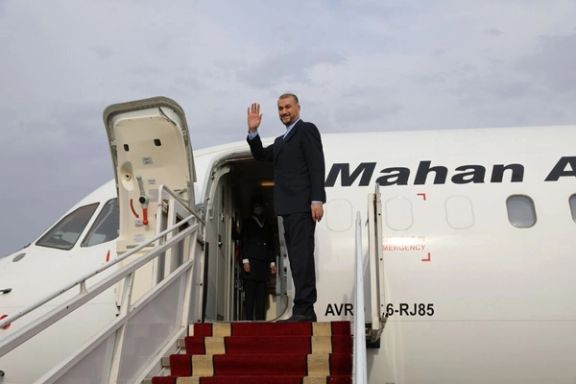
Iran's Foreign Minister departed from Oman to Damascus on Monday in the wake of last week’s airstrike on Iran's consulate in the Syrian capital.
The Israeli attack led to the deaths of seven Revolutionary Guard Corps (IRGC) members including two commanders on the compound believed to be a key base for the IRGC.
Hossein Amirabdollahian is accompanied by Vahid Jalalzadeh, the head of the National Security and Foreign Policy Commission of the Parliament.
Iran has pledged to retaliate for the deaths of its personnel in the strike. A senior adviser to Iran's Supreme Leader warned on Sunday that Israeli embassies were now potential targets.
Amirabdollahian, who initiated his regional tour in Muscat, where he engaged with Omani officials and met with a representative of Yemen's Houthi group, Mohamed Abdelsalam, condemned the attack while in Oman.
"The attack on Iran's embassy building in Damascus is a new step in Israel's warmongering and its attempt to expand war regionally," said Amirabdollahian.
The Omani Foreign Minister, Badr Al-Busaidi, also called for de-escalation during discussions with his Iranian counterpart. Meanwhile, Israel, in line with its usual practice, declined to comment on the incident when approached by media.
Israel's Defense Minister Yoav Gallant had previously stated that Israel was prepared for any potential retaliation from Iran.
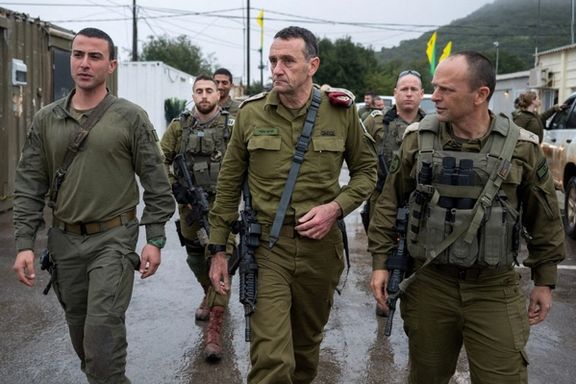
Amidst anticipation of Iran's response to the Israeli airstrike on its Damascus consulate, Israel's military chief emphasizes his country's readiness for both offensive and defensive actions against Iran.
IDF Chief of Staff Lt. Gen. Herzi Halevi said on Sunday that the Israeli military “knows how to deal with Iran, in attack and defense.” He made the remarks as Iranian officials threaten to retaliate for Israel’s April 1 air strike that killed seven IRGC officers, including a senior commander of Quds Force, the extraterritorial wing of the IRGC.
Highlighting that Israel is “in a multi-front war,” Halevi said that “IDF troops are prepared and operating in all arenas, in the south, in the north, in Judea and Samaria and in more distant arenas.”
Halevi also highlighted that Israel is “cooperating with the United States and with strategic partners in the region," and that the IDF can “act forcefully against Iran in both near and distant places.”
“Iran does not only threaten Israel, but the entire Western and Arab world, Iran is a global problem, was and remains, the big problem,” he underlined.
His remarks came a few hours after Iranian General Yahya Rahim Safavi, the top military advisor of the Supreme Leader, reiterated threats against Israeli embassies worldwide, saying none of them are safe anymore. According to Tasnim news agency, affiliated with the Revolutionary Guards, Safavi said, “The shadow of fear and terror looms over the occupied lands, and the Zionists see the specter of death in their dreams every night.”
Halevi said that the IDF is fully prepared, emphasizing that “There is no reason to panic, but there is also no room for complacency. We must be aware of the situation, and always ready.”
He says that since the beginning of the war in Gaza, “Iran has tried to disavow and hide from direct involvement in it, but we know that it activates, directs, finances and transfers knowledge to all its proxies in the region, from Hezbollah, through Judea and Samaria to Yemen.”
Echoing the same sentiments, Israel's defense minister stated earlier in the day that his country was ready to handle any scenario that may develop with its foe Iran as it stayed on alert for a possible retaliatory attack. Defense Minister Yoav Gallant's office made the statement after he held an "operational situation assessment" with senior military officers.
While the IRGC and its media outlets clamor for war and a swift response, commentators and some senior clerics advocate a measured approach, warning that the strike might be a trap to drag Iran into a direct conflict.
Israeli attacks have killed 18 senior IRGC officers since December, a trend that has become difficult to explain away by the Islamic Republic.
Many regional countries would like to see Iran directly involved in a war with Israel because it will inflict great damage on the country, two Iranian commentators said Sunday. “The interests of all actors in the region today lie in dragging Iran into war," said the former chairman of Iranian parliament’s national security and foreign policy committee, Heshmatollah Falahatpisheh.
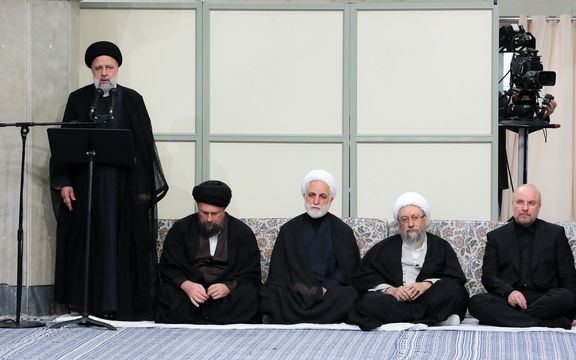
Opinion - One week following Israel's targeted strike on the Iranian embassy in Damascus, resulting in the deaths of seven high-ranking Quds Force officers, Tehran appears undecided on its response.
President Ebrahim Raisi participated in an evening session of Iran's National Security Council shortly after the incident, yet no definitive actions were announced.
Following the extraordinary meeting, Iran dispatched a letter to the UN Security Council regarding Israel's attack, delivered by the nation's deputy representative to the United Nations. Apart from this diplomatic action, holding funerals, and engaging in extensive propaganda emphasizing martyrdom, the regime has refrained from further measures.
"Definitely, in connection with the attack on the Iranian consular building in Damascus, several meetings of the Supreme National Security Council have been held at the level of leaders" says the Raisi administration’s Minister of Sports and Youth. The recurrence of these meetings suggests an internal divide among security, military, and political leaders regarding the appropriate response to what Tehran perceives as a significant Israeli provocation. The absence of concrete action a week after the incident may also indicate underlying disagreements.
The Islamist government and its supporters faced a significant setback following the killing of Qasem Soleimani, compounded by the opposition's jubilation, praising Bibi Netanyahu as "the only friend in difficult times." Their reactions have been limited to mere promises of retaliation and statements from the Leader’s office vowing the destruction of Israel. While these actions may serve as propaganda tools, they fall short in alleviating the humiliation felt by the regime.
While IRGC circles continue to threaten a harsh retaliation, other regime circles, such as Friday Imams call for caution and “strategic patience. The publication of a claim that Mohammad Reza Zahedi, the top general killed in Damascus, was one of the planners of the October 7 Hamas attack partially reinforces the idea that revenge has already been taken and there is no need for further action.
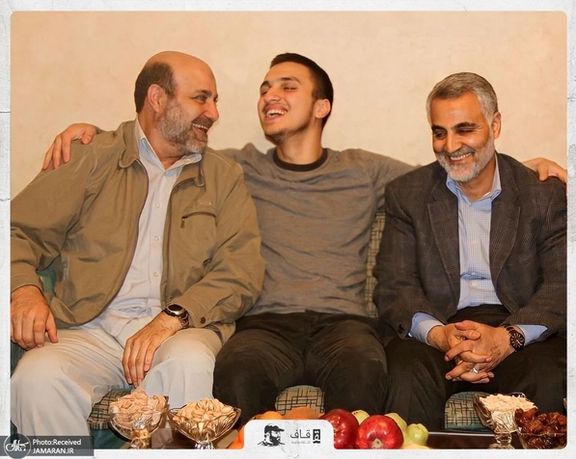
This reluctance to respond indicates that the IRGC is further entrenching itself in its predicament. Tensions are escalating both internally and externally, with society increasingly resentful toward the authorities. The decision to forego a separate funeral for the deceased and instead incorporate their memorial into Friday prayers underscores this sentiment.
Any serious escalation and possibly a direct war with Israel, will deal a heavy blow to Iran’s beleaguered economy, a scenario probably loathed by many politicians within the clerical-military system. Already, the currency rial has fallen by 30 percent since early January, and now stands close to 650,000 to the US dollar.
Another significant hurdle to a military retaliation is the profound deficiency in Iranian intelligence operations within Syria, enabling the success of Israel's actions. Furthermore, as time elapses, the range of available but untapped options diminishes, complicating the decision-making process for a response. Since October 7, the foreign operations of the Quds Force have already exhausted some of their most readily deployable strategies, such as missile launches and assaults on commercial vessels.
Some believe that Israel has already given Iran’s rulers the opportunity for justifying inaction, by saying that the attack on the embassy in Damascus was a response to a serious attack on Eilat by Iran’s proxies. The panic-buying in Israeli supermarkets was also portrayed in Iranian government-controlled media as a victory without having fired a shot.
The opinions expressed by the author are not necessarily the views of Iran International
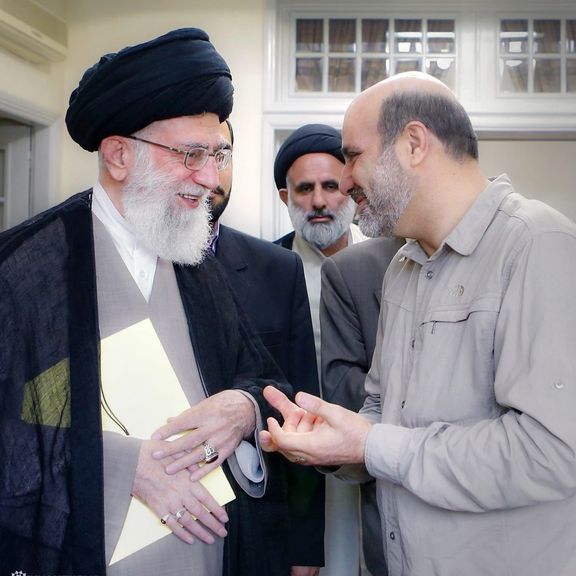
New revelations from a former Revolutionary Guard commander say the senior IRGC commander of operations in Syria and Lebanon killed in an Israeli airstrike last week was one of the top generals trusted by Iran’s Supreme Leader.
Yahya Rahim Safavi, former commander of Iran’s Revolutionary Guard and Khamenei's chief military adviser, disclosed that Mohammadreza Zahedi was among four key figures he introduced to Ali Khamenei. The others mentioned by Safavi were prominent figures Qasem Soleimani, Ahmad Kazemi, and Mohammad Hajazi, all of whom have now died, two of them assassinated.
Zahedi, along with several key IRGC officers, was killed in a precision Israeli airstrike targeting Iran's consulate building in Damascus on April 1. Zahedi's involvement in planning and executing a deadly attack against Israel on October 7, which claimed over 1,200 mostly civilian lives, is reported to have contributed to his killing.
Qasem Soleimani, renowned for his role within Iran's military and intelligence apparatus, was also assassinated in a US drone strike near Baghdad International Airport on January 3, 2020, during the tenure of former President Donald Trump. Soleimani had been instrumental in orchestrating Iran's military presence in Syria and fostering proxy militant groups in the region.
Ahmad Kazemi, who had held the position of Commander of the Air Forces of the Revolutionary Guards, died in a plane crash near Urmia, located in western Iran in 2006.
Mohammad Hajazi, a lifelong member of the Revolutionary Guard since May 1979, served as an intelligence and security advisor to Supreme Leader Ali Khamenei. He rose through the ranks to become the Deputy Commander of the Quds Force, prior to his death from heart disease in 2021.
Hezbollah and the Israeli military have been exchanging fire across Lebanon's southern frontier in parallel with the Gaza war, adding to fears of a wider regional conflict.
Early on Monday, Israeli fighter jets hit the village of al-Sultaniyah and killed a field commander in Hezbollah's elite Radwan units and two other people, the Israeli military and two Lebanese security sources said.
The Israeli military identified the commander as Ali Ahmed Hassin, and said he was responsible for planning and executing attacks against Israelis. Hezbollah issued a funeral notice for Hassin but without details of his role.
Israeli strikes have killed around 270 Hezbollah fighters in the last six months as well as around 50 civilians, including children, medics and journalists. Hezbollah's rocket fire has killed around a dozen Israeli soldiers and half as many civilians.
In a joint statement on Monday, United Nations' Special Coordinator for Lebanon Joanna Wronecka and the commander of the UN peacekeeping mission in Lebanon, Aroldo Lazaro, said the violence must stop.
"The unrelenting cycle of strikes and counterstrikes in breach of the cessation of hostilities constitute the most serious violation of Security Council Resolution 1701 since its adoption in 2006," they said.
That UN decision ended a month-long war between Hezbollah and Israel nearly two decades ago but many of its points - including a withdrawal of armed groups from the south and deployment of Lebanese army troops - were never implemented.







Tweet unavailable